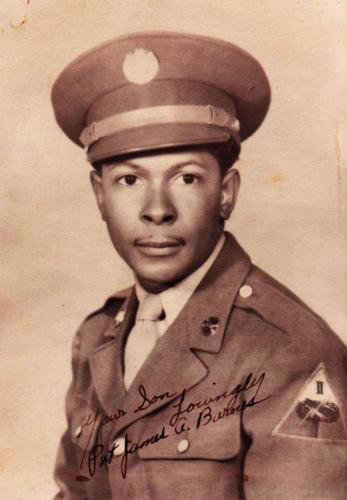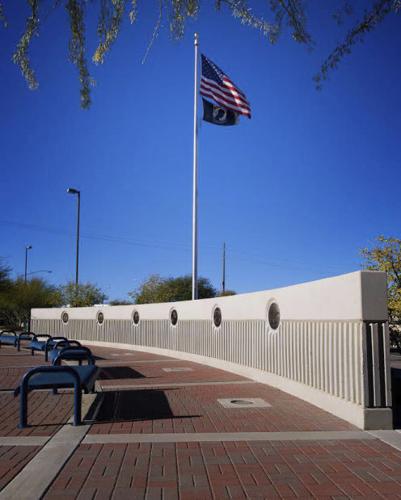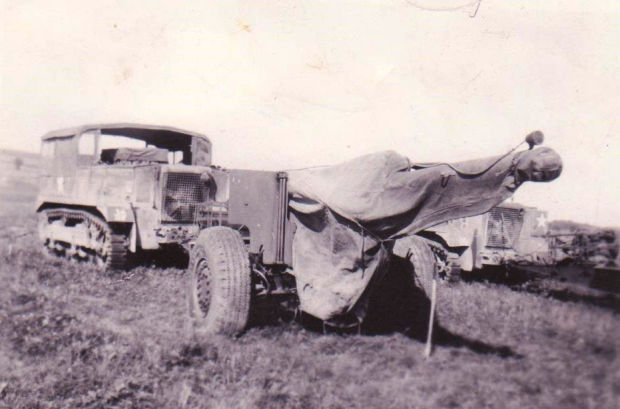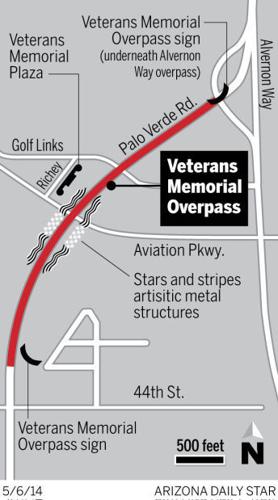Veterans Memorial Overpass and the Veterans Memorial Plaza were built in 2005. They are named in honor of all veterans — the U.S. Army, Navy, Air Force, Marines and Coast Guard, said Priscilla S. Cornelio, director of the Pima County department of Transportation.
As Memorial Day approaches, upcoming Street Smarts will share the stories of four local veterans.
First, James A. Barnes, who was born Lee Hopkins, to James C. Barnes and Amanda Hopkins in 1919, in Mississippi. His parents, both 18, lived with their parents — his mother’s family members were sharecroppers and his father’s family owned their land. For the first five years he was raised by his mother, and then went into the care of his paternal grandmother Mary (Cornelius) Barnes Hill, who changed his name to James A. Barnes.
Barnes attended a segregated country school that taught first through eighth grades. It had no electricity, bathrooms or running water. A teacher would assign two students to bring water in a bucket from a well about a mile away.
When Barnes was 15, his father, who was working as a machinist for the Southern Pacific Railroad in Tucson, returned to Mississippi. He brought his son with him to Tucson, arriving Jan. 1, 1935.
In Tucson, Barnes attended Dunbar School (later John Spring Junior High and now Dunbar Cultural Center), at that point the only school African-Americans were allowed to attend from first to ninth grades.
Although he had graduated eighth grade in Mississippi, and should have been in ninth grade, Barnes was so smitten with a girl named Mary that he got himself put back to the seventh grade to be in the same class as her. At Dunbar, he ran track with Joe Batiste (considered by some to be the best all-around athlete in Tucson history).
In 1938, Barnes started 10th grade at Tucson High School, and for the first time attended school with Mexican-Americans and Anglos.
After graduating, he worked at the Rancho Linda Vista guest ranch near Oracle as a houseman. His job included taking care of seven cabins, where he brought in firewood to make fires during the winter, made beds, picked up guests from the train station and attended to other duties.
In 1942, Barnes was living in San Diego and was required to register for the draft. He was then sent to San Pedro, Calif., to take an aptitude test to see if he qualified for Officer Training School. After passing the test, he was sent to Fort Sill, Oklahoma, to begin training to become an officer but at the last moment, the class was canceled. He was then sent to Camp Beal, near Sacramento, California., for 13 months of training to serve in a field artillery unit.
After training he was sent to Germany, where he spent 17 months in the European Theater including nine months in the combat zone with Battery C, 777th Field Artillery Battalion, an African-American unit of the 9th Army.
Barnes remembered one close call during World War II. His military group was in the German countryside when all of the men, with the exception of Barnes and another soldier, left to eat at the mess hall a couple miles away. While the two soldiers were digging about four feet apart from each other, a projectile whizzed between them, hit a tree and exploded about 50 feet from them.
After the war ended, Barnes, spent about four to six weeks guarding German prisoners of war before coming back to the U.S. and being honorably discharged at Fort Jackson, South Carolina, in December 1945. During his time in the service, he was awarded the Good Conduct Medal and a Sharpshooter commendation.
He returned to Tucson in 1945 and went to work for the Southern Pacific Railroad, working for 17 years. After that, he worked for many years at the University of Arizona as a custodial supervisor.
In 1947, he married Freddie Kelly, who worked for many years for Tucson Parks and Recreation. They had two children, James F. Barnes and Jacque (Barnes) Price.
Today, at 94, Barnes enjoys watching the Arizona Wildcats, Arizona Diamondbacks and Los Angeles Dodgers on television.









